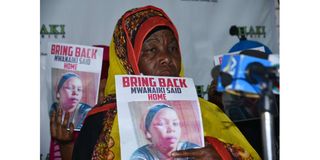Saudi eases ‘slave-like’ restrictions on domestic workers

Saumu Omar narrates how her 34 year-old daughter Mwanaiki Said is suffering in the hands of her employers in Madina, Saudi Arabia, on October 6.
What you need to know:
- The reforms are meant to boost the competitiveness of the Gulf kingdom as a labour destination.
The Islamic country has more than 10 million foreign workers, predominantly from poor African and Asian countries.
Tales of Kenyans being subjected to inhumane treatment in Saudi Arabia may soon fizzle out after the country withdrew stringent restrictions on migrant workers.
The relaxation of labour restrictions, announced on Wednesday by Saudi Arabia’s Human Resources Deputy Minister Abdullah bin Nasser Abuthunain, is part of reforms spearheaded by Crown Prince Mohammed bin Salman.
The reforms, which are expected to take effect from next March, are meant to boost the competitiveness of the Gulf kingdom as a labour destination.
The Islamic country has more than 10 million foreign workers, predominantly from poor African and Asian countries.
Saudi Arabia operates under the oppressive ‘kafala’ system, which forbids migrant workers from changing jobs or leaving the country without the employer’s consent.
Sponsorship system
Kafala is Arabic for “sponsorship system”, a worker-employer engagement model that monitors and regulates migrant domestic and construction workers in the Gulf Cooperation Council countries.
The system dates back to the 1950s and is widely embraced in Bahrain, Kuwait, Saudi Arabia, Lebanon, Qatar and the United Arab Emirates.
Migrant informal workers in any of these countries are required to have a host or sponsor. Job-seekers are usually linked to potential employers by job agencies.
Upon arrival, the worker’s welfare, visa and legal status are taken care of by the employer, who, in most cases, is the only point of contact for the worker. Most employers block their workers from travelling back home by confiscating their visa and passport.
Human rights groups and labour organisations have condemned the system over exploitation of workers with no consequences to the employer. A 2008 Human Rights Watch (HRW) report likened the system to modern-day slavery.
Unable to bear the harsh conditions, hundreds of workers flee from their employers, leaving their documents behind. Many end up being arrested and locked up in ‘‘labore’’ (the labour office) for being in the host country “illegally”.
Unless a consensus is reached with one’s employer, the workers languish in the labour office sometimes for months.
Detained for weeks
In June, Winfrey Nyawira and Teresia Wanjiku were detained for weeks at a hotel in Riyadh following disputes with their employers.
And for several months now, Naomi Owuor, another domestic worker in Saudi, has been missing. Ms Owuor had travelled to the Arab country late last year to work as a nanny. In July, she disappeared without a trace.
Her colleagues Winfrey Nyawira and Olga Cheruto told the Nation that Ms Owuor had clashed with her employer. Days later, her phone was switched off and has been offline since. Her employer has also been unreachable.
Efforts by the Kenyan government to rescue workers trapped in Gulf countries have always hit a snag, owing to the fact that the kafala system protects the employers.
According to the HRW, the high “adoption” fees employers pay recruiters kind of give them near-exclusive power over the worker.
An investigation by the Nation this year found that some agencies make as much as 20,000 Saudi Riyal (approximately Sh570,000) for each Kenyan worker linked to an employer in the gulf countries. This fee is sometimes paid long before the worker boards the plane.
This, the HRW argues, emboldens employers to subject workers to slave-like conditions marked by many working hours for poor and often delayed pay.
Some are even whipped by their employers in the name of inculcating ‘discipline’ in them.
Clear physical address
The integrity of some recruiting agencies in Kenya has come under close scrutiny. While the National Employment Authority (NEA) requires them to have a clear physical address, some operate from dingy or shadowy addresses in the city.
Efforts by the Nation to reach out to Nile Treasure Gate Ltd, Cheruto Agency and Pgidee Agency Ltd for months now have not yielded any results.
The promise of a well-paying job for Teresia Wanjiku, a mother of three from Kajiado County, turned into a nightmare when she ended up in the hands of an abusive employer.
Ms Wanjiku would be denied food she had prepared besides being overworked and even physically assaulted.
“Madam would beat me up whenever we disagreed. When I reported her to my agent, he repossessed my passport,” Ms Wanjiku told the Nation in September.
In most cases, kafala takes precedence over job contracts, rendering the worker defenceless in the event of a dispute.
When she fell ill and couldn’t work, she fled and reported her employer and her agency to the labour office.
The agent threatened her and her pay was withheld, further complicating her plans to flee the country.
“My agent told me that I had to return to my employer to get my money,” she said.
When she realised that no help would come her way from the Kenyan embassy in Riyadh, Ms Wanjiku went back to her employer’s house, a decision she would later regret.




